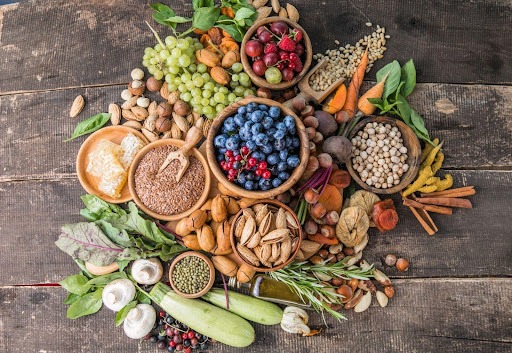Healthy Eating for Menopause – Mediterranean Diet For Managing Symptoms
Incorporating the Mediterranean Diet into Your Menopause Journey
Women must put their health and well-being first during the menopausal transition. A woman’s quality of life may be greatly impacted by the numerous physiological changes that come with menopause, a normal biological process. The most effective weapon a woman has in her arsenal against hot flashes, mood swings, and elevated health risks is her diet.
The Mediterranean diet is a culinary custom that has withstood the test of time and is now recognized as a contemporary health marvel. This diet, which is abundant in fruits, vegetables, whole grains, legumes, nuts, seeds, and olive oil, not only pleases the palate but also gives women the tools they need to take charge of their health during the menopausal period by offering a scientifically proven solution to numerous medical conditions.
This article explores the anti-inflammatory qualities, functional foods, and essential nutrients of the Mediterranean diet and how they can transform menopausal health. Through the integration of modern nutritional science with the age-old wisdom of Mediterranean eating, we reveal how this diet, supported by extensive scientific research, can support women in embracing menopause with grace, strength, and vitality while also giving women confidence in its efficacy.
Understanding Menopause and Nutritional Needs
Menopause brings about various physiological changes, primarily due to declining estrogen levels.
These changes include:
- Bone Health: Increased risk of osteoporosis due to accelerated bone loss.
- Cardiovascular Health: There is a higher risk of heart disease as lipid profiles and blood pressure are affected.
- Weight Management: Tendency to gain weight, especially around the abdomen.
- Mood and Cognitive Function: Potential for mood swings and cognitive decline.
Addressing these concerns through a well-balanced diet is essential, and the Mediterranean diet offers a comprehensive solution. With its rich nutrient profile, this diet can significantly support overall health during menopause.
Core Components of the Mediterranean Diet

The Mediterranean diet emphasizes:
- Fruits and Vegetables: High in vitamins, minerals, and antioxidants. For example, spinach and kale are rich in calcium, magnesium, and vitamin K, essential for bone health.
- Whole Grains: Quinoa, barley, and brown rice provide fiber and essential nutrients, supporting digestive health and reducing cholesterol levels.
- Legumes: Lentils, chickpeas, and beans are high in protein, fiber, and phytoestrogens, aiding in hormone regulation and weight management.
- Nuts and Seeds: Almonds, walnuts, chia seeds, and flaxseeds provide essential fatty acids, fiber, and phytoestrogens, which can help balance hormones and support cardiovascular health.
- Olive Oil: Extra virgin olive oil is rich in monounsaturated fats and polyphenols, which have anti-inflammatory and antioxidant properties. Studies have shown that olive oil can help reduce the risk of heart disease and lower blood pressure.
- Fish and Seafood: Excellent source of omega-3 fatty acids.
- Dairy: Consumed in moderation, primarily as cheese and yogurt.
- Poultry and Eggs: Moderate consumption of protein.
- Red Meat and Sweets: Limited intake to reduce saturated fat and sugar consumption.
Dietary Guidelines for Menopause
During menopause, it’s crucial to maintain a balanced diet to get all the necessary nutrients:
Calcium Intake
Your bone health is a priority during menopause. Consume two to four servings of dairy products and other calcium-rich foods daily, aiming for 1,200 milligrams. This will help you maintain strong and healthy bones.
Iron Consumption
Include at least three servings of iron-rich foods in your daily diet. Good sources of iron are lean red meat, poultry, fish, eggs, leafy green vegetables, nuts, and fortified grain products. The recommended dietary allowance for iron in older women is 8 milligrams daily.
Vitamin D
Vitamin D, which aids in calcium absorption, can be obtained from sunlight exposure, fatty fish, and fortified foods.
Fiber-Rich Foods
Choose foods high in fiber, such as whole-grain bread, cereals, pasta, rice, and fresh fruits and vegetables. Most adult women should consume about 21 grams of fiber each day.

Fruits and Vegetables
Eat at least 1 1/2 cups of fruit and 2 cups of vegetables daily.
Check Food Labels
Utilize nutritional information on packaging to make informed and healthy dietary choices. Research indicates that individuals who regularly read nutritional labels tend to make healthier food choices and have better diet quality.
Stay Hydrated
Aim to drink approximately eight glasses of water daily to meet most healthy adults’ hydration needs.
Reduce High-Fat Foods
According to the American Heart Association, keeping total fat intake to 25% to 35% of daily calories and containing saturated fat below 7% helps maintain healthy cholesterol levels and reduces heart disease risk. Additionally, research shows that trans fats, commonly found in processed foods, are linked to increased cholesterol and heart disease risk.
Moderate Sugar and Salt Consumption
Studies have consistently shown a correlation between high sodium intake and increased blood pressure, a significant risk factor for cardiovascular diseases. The World Health Organization reports that nitrates in processed foods can convert into carcinogenic compounds, increasing cancer risk.
Functional Foods and Essential Nutrients
Omega-3 Fatty Acids
Omega-3 fatty acids found abundantly in fish and seafood, have been shown to reduce inflammation, lower the risk of heart disease, and improve cognitive function. Incorporating fatty fish like salmon, mackerel, and sardines into your diet can provide these essential nutrients.
Phytoestrogens
Phytoestrogens, found in legumes, nuts, and seeds, mimic the effects of estrogen in the body and can help alleviate menopausal symptoms such as hot flashes and night sweats. Including foods like soybeans, flaxseeds, and sesame seeds can be beneficial. Phytoestrogens are a type of plant compound that can act like estrogen in the body. They are found in many foods, particularly soy products, and can have both estrogen-like and anti-estrogen effects.
Antioxidants
Antioxidants found in fruits and vegetables help combat oxidative stress, a condition that occurs when there’s an imbalance between free radicals and antioxidants in your body. This imbalance can lead to cell and tissue damage. Berries, citrus fruits, and leafy greens are rich in antioxidants and should be included in your daily diet to help combat oxidative stress.
Incorporating the Mediterranean Diet into Your Lifestyle
Meal Planning
Planning your meals around the core components of the Mediterranean diet can help you maintain a balanced and nutritious diet. Incorporate a variety of fruits, vegetables, whole grains, and lean proteins into your meals. For instance, you could start your day with Greek yogurt and fruit parfait, have a salad with mixed greens, tomatoes, cucumbers, and olives for lunch, and enjoy a dinner of grilled salmon with a side of quinoa and steamed vegetables.

Cooking Methods
Opt for healthy cooking methods such as grilling, baking, steaming, and sautéing with olive oil. These methods help retain foods’ nutritional value and reduce the intake of unhealthy fats.
Portion Control
Practicing portion control is essential for weight management. Use smaller plates, measure servings, and avoid going back for seconds. Eating slowly and mindfully can also help prevent overeating.
Mindful Eating
Pay attention to your body’s hunger and fullness cues. Avoid distractions such as television or smartphones while eating. Enjoy your meals and savor the flavors and textures of the food.
Physical Activity
Incorporate regular physical activity into your routine to complement your diet. Exercise can help maintain a healthy weight, strengthen bones, and improve mood and cognitive function. Aim for at least 30 minutes of moderate exercise most days of the week.
Key Takeaway
Navigating menopause can be challenging, but adopting a Mediterranean diet offers a holistic and scientifically backed approach to managing its symptoms and promoting overall health. By focusing on nutrient-dense foods and balanced meals, women can address the unique nutritional needs of menopause, support bone and cardiovascular health, and enhance their quality of life.
The Mediterranean diet’s emphasis on fruits, vegetables, whole grains, legumes, nuts, seeds, and olive oil provides a rich array of nutrients that can help mitigate menopausal symptoms and reduce the risk of chronic diseases. Incorporating these foods into your daily routine, mindful eating practices, and regular physical activity can empower you to embrace menopause with strength, vitality, and grace.
Ready to take control of your menopausal journey with personalized nutrition guidance? Download the Miror App today and unlock access to expert nutritionist consultations tailored to your needs. Join our vibrant community of women navigating perimenopause and menopause together, sharing experiences, tips, and support. Empower yourself with the tools and knowledge you need to embrace this new chapter with strength, vitality, and grace.
Don’t wait, take the first step towards a healthier, happier you with Miror.




